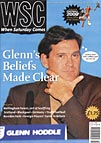 A tale of football, betrayal and a kangaroo. Sam Beckwith reports on the peculiar case of Bohemians Prague
A tale of football, betrayal and a kangaroo. Sam Beckwith reports on the peculiar case of Bohemians Prague
British fans looking for a second home in Prague could do much worse than visit Bohemians’ D’olnicka stadium. The stadium – Bohemians’ home since 1932 – fits your image of a classic football ground – the crowd is squeezed right up against the pitch, creating a good atmosphere even if the attendance doesn’t often top 4,000. There’s a large grandstand to one side, and vociferous support from the terrace behind the goal. But the chance to see a game there could already be gone, as Bohemians fans face some unattractive, but familiar, aspects of the modern game – cold-blooded redevelopers, and an enforced move from their home.
The Prague team, now in the Czech Second Division, is a treasure trove for lovers of obscure football history. In 1927 the club, then named AFK Vrsovice, was invited on a trip to Australia and named itself after the largest Czech province, Bohemia. In the early years of communist rule the club went through some bewildering name changes, including Sokol Zeleznicari Bohemians (Railway Workers Bohemians) and the equally unwieldy Spartak Stalingrad Vrsovice, before happily returning to plain Bohemians Praha in 1965.
During the Australian tour, the club was presented with a kangaroo, which found a home in Prague zoo, and the nickname stuck. The kangaroo is on the team badge, and recently an intense, bearded man in a green, lumpy, moth-eaten kangaroo costume has accompanied the team onto the pitch, only to spend the rest of the game with his head off, glaring at fans and players.
Even the name D’olnicka has an endearing quality. Literally it means “little pit”, but it is better known to Czechs as the word for the hole in a game of marbles. It is the stadium, and the land it is built on, that is predictably at the centre of the dispute. The roots of the crisis stretch back to 1993, when Dalibor Lacina and Ivan Bat’ka were club directors. The pair claimed ambitious plans for Bohemians, then a First Divsion team, and were reasonably popular with the fans, even though Lacina had already driven Sparta Prague, the city’s biggest club, into huge debt and been forced to sell up. Unsurprisingly, the trick was repeated at Bohemians. Under Lacina and Bat’ka, the club snapped up has-beens. Accusations flew that Bohemians players were throwing games. Lacina and Bat’ka’s malaise spread to the pitch. When current coach Vladimir Petrzela took over, the club was heading for relegation with large debts and 40 players on its books.
Lacina and Bat’ka left Bohemians in the summer, handing over power to Pavel Svarc – or so it seemed. Because of the complex structure of communist-era sports teams, the ownership of D’olnicka lies not with FC Bohemians, but with TJ Bohemians, an umbrella organisation for the various Bohemians sports clubs. TJ Bohemians agreed to lease D’olnicka to FC Bohemians for 70 years in 1993, at a symbolic rate of one crown (2p) a year. Over the summer, however, under Bat’ka and Lacina’s influence, TJ reneged on the deal, and gave ownership of the stadium to Bohemians Real, a new company headed by the scheming duo.
Their pie-in-the-sky plans went back on the drawing board, with TJ authorizing Bohemians Real to raise money for stadium redevelopment that would begin, they said, in five years’ time. Perhaps. But to get some idea of how unnecessary a large new stadium would be in Prague, consider that the city’s premier club, Sparta, attract less than 4,000 fans to an average league game at their 22,000 all-seater.
With this green light from TJ, Bohemians Real drew up a new contract for FC Bohemians, demanding unrealistic sums of money from the club. However, Svarc has refused to sign, saying that, if necessary, he’ll take Bohemians to the soulless stadium complex at Strahov, on the other side of the city, where he would pay half the price for stadium rental.
Antonin Panenka – a Bohemians legend in the Seventies, scorer of the penalty that won the 1976 European Championship final and now one of Petrzela’s assistants – has joined the argument, calling Bohemians Real “hard businessmen who care nothing for football”. The fans too, are solidly behind FC Bohemians. At the last two home games of the autumn, there were anti-Bohemians Real banners and chants and the players who have led Bohemians to the top of the Second Division were given a huge ovation.
The Bohemians’ website, an official site run by fans, has become a rallying point for fans angry at Bohemians Real. According to Martin Slavik, who runs the English-language section of the site, 99 per cent of Bohemians fans would rather move to Strahov than co-operate with Bohemians Real, but all fans hope the Kangaroos will return to D’olnicka soon. It’s going to be a lively spring.
From WSC 145 March 1999. What was happening this month